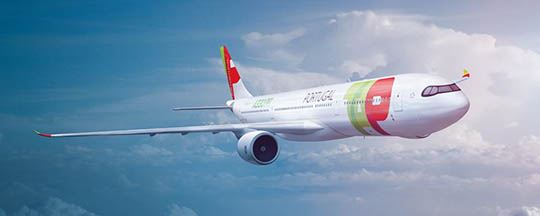Environmental commitment
Promote efficiency and protect the Environment.
We at TAP are always working to become more efficient, offering our passengers a top-quality service and ensuring high-safety standards.
Promoting the company's sustainable growth is one of TAP's top commitments. The challenges facing an airline such as TAP go well beyond air transport activities, and include the facilities where the company operates and assures the maintenance of aircraft, engines, and many components.
The aviation industry, and TAP in particular, is facing major challenges due to current world events. Outlining a consolidated strategy that will allow the economic recovery of the company, the tourism industry and the country in general - while observing high-quality standards - will only be possible if we commit to minimizing the environmental impact of our operations.
IATA Environmental Certification
TAP and Portugália Airlines have successfully obtained the IEnvA certification
In the IATA environmental certification (IEnvA) framework based on ISO 14001, TAP and Portugália reinforce their determination by approving their environmental policy.
Committed to implementing procedures that continually improve the environmental performance of their operations, TAP and Portugália are determined to optimize the control of the impact of their daily activities in environmental matters. Through a structured and planned approach, this environmental management system aims to ensure the effectiveness of incorporating good practices to minimize environmental impacts.
At this early stage, the certification focuses on activities that generate significant environmental impacts — such as waste management, emissions, and consumption — covering flight operations and corporate facilities. Consequently, TAP and Portugália strengthen their commitment to reducing environmental impacts, contributing to more efficient and responsible operations.

IEnvA Scope
IATA Environmental Assessment

Flight Operations
Global activities to be considered shall include:
- Aircraft taxi, take-off, cruise, approach and landing
- Cabin operations during flight
- Emergency and unforeseen situations related to flight operations

Corporate Buildings
Activities at local corporate buildings to be considered shall include:
- Facilities Management
- Office Activities
- Procurement of aircraft and aircraft cabin products as well as products related to facilities management and office activities
Download the Environmental Policy
Energy efficiency and CO2 emissions
The decarbonization of the aviation sector is a major challenge when it comes to sustainable mobility, as dependence on fossil fuels is still quite high. While technological solutions for the energy transition are not yet widely accessible, the Company continues to work on projects and initiatives aimed at reducing its environmental footprint.
The entry into operation of more efficient aircraft models, as part of the TAP fleet modernization program, has allowed for significant improvements in terms of efficient energy use and environmental protection. These new aircraft feature more efficient combustion engines, making it possible to reduce up to 20% in fuel consumption and carbon dioxide (CO2) emissions.
At TAP, the operation's energy efficiency indicator is measured through fuel consumption per passenger, over a 100-kilometer route flown.
In 2024, TAP's energy and environmental efficiency indicator improved by 9.7% compared to 2019.


Reducing weight on board
Reducing weight on board translates into reduced fuel consumption. TAP is committed to this goal and has implemented several initiatives in recent years. Of note is the upgrade of operational trolleys to more modern and lighter models, in addition to the revision of catering loading plans. These measures have the potential to reduce annual consumption by around 1 700 tonnes of fuel, thus avoiding the emission of approximately 5 350 tonnes of CO2.
Sustainability on board – Sustainable Cabin
The design of lighter and more sustainable cabins is one of the strategic objectives of the aviation sector, reflecting commitment to efficiency and minimizing environmental impact. The use of innovative and lighter materials helps to reduce fuel consumption and carbon dioxide emissions, promoting more efficient operations.
In the in-flight experience, TAP has been investing in more sustainable products and services, in line with our customers' expectations and the best practices in the sector.
Focused on reducing the amount of single-use plastic on board aircraft, TAP is committed to finding reusable and more sustainable options on the market that allow this material to be replaced while maintaining the high safety standards established throughout the company and following market trends in terms of materials.
By way of example, TAP has already introduced wooden coffee stirrers to replace the disposable plastic ones previously used. On long-haul routes, plastic casings have been removed from headphones and comfort kits. Several materials used on flights are already reusable and therefore collected by our service providers in Portugal.
From disposable to rotable, with a focus on national production
67.5% of non-food items on board are already rotable (equipment, comfort kits, non-consumable materials), which represents practically all items that are viable for this purpose, in the context of on-board service to 16.1 million passengers during the year 2024, without causing an increase in emissions, caused by factors such as weight on board or consumption of water resources due to washing items, for example.
In 2023, TAP took an important step by introducing rotable and recyclable tableware in economy class on long-haul flights. From a circular economy perspective, materials, when damaged or at end of life, are reintroduced into the production process of new units through a closed-loop recycling circuit.


Voluntary Carbon Offsetting Program
TAP’s carbon offset programme, available for over 10 years, is a voluntary mechanism that allows our customers to address the CO2 emissions from their travels, by supporting certified projects that reduce or remove CO2 emissions in an amount equivalent to the estimated carbon footprint of their trips.
While TAP acknowledges that offsetting emissions is only a small contribution to tackle climate change, this program provide our customers with options for supporting climate action around the world.
Regular Passengers and TAP Corporate | Emissions offsetting option available on flyTAP and TAP Corporate booking portals. In 2024, an exclusive platform will be made available to Corporate customers where it will be possible to monitor, measure and address CO2 emissions through certified projects.
For more information about the program, see the dedicated page.
TAP Air Cargo Customers | Emissions offsetting option is available on the dedicated platform. On this portal, TAP Air Cargo Customers, after registering on the platform, will be able to monitor, measure the CO2 emissions associated with cargo transport and address them through certified projects.
Supported Certified Projects:
- Doyon Native Community Forest Project | United States | Forest management.
- Landfill Gas Extraction Project | Turkey | Renewable energy.
- Theparak Wind Farm Project | Thailand | Renewable energy.
- Toyola Energy Project | Nigeria | Health and livelihoods.
+ 152,000 tonnes of carbon dioxide have been offset since the beginning of the programme (2009-2024).
Waste
Responsible waste management not only minimizes the environmental impact of our operations but also improves the efficiency of processes and reinforces environmental awareness among employees.
In this sense, we are reinforcing our commitment to sustainability, acting on two fundamental fronts of our activity: on board aircraft and on the ground.
- On board
In 2024, TAP focused its efforts on creating conditions on board to optimize waste separation and enable recycling. As part of this initiative, safety trolleys and waste trolleys were converted into recycling trolleys, allowing for more efficient management of the waste produced. In addition, the training and involvement of crews through communication actions and the availability of the Sustainability Guide on board was reinforced.
In parallel, TAP worked closely with the main catering provider of the Lisbon hub to ensure proper waste segregation, as well as its auditing and monitoring.
- Ground Operations
At the Company's headquarters, there is a waste management program with the objective of promoting the efficient segregation of the waste produced. This program not only aims to meet existing environmental requirements, but also to actively raise awareness among our employees of the importance of adopting measures that reduce waste production.
Noise
Biodiversity
Since 2015, TAP has prohibited the shipment of animal trophies, laboratory animals, shark fins and any part of animals that appear on the list of "Endangered Animals", as freight. In 2017, TAP became signatory of the Buckingham Palace Declaration which aims to reduce the illegal trade of wildlife, following 2016 IATA’s AGM Resolution unanimously endorsed, denouncing the illegal trade in wildlife and wildlife products, and pledging to partner with government authorities and conservation organizations in the fight against the trafficking of protected species.








